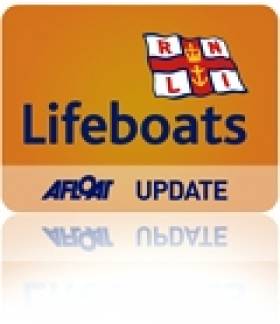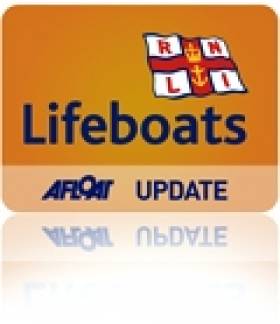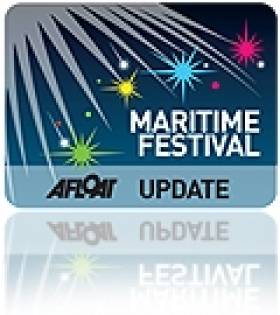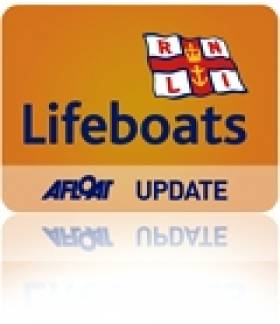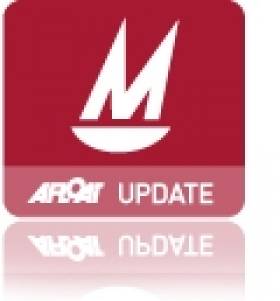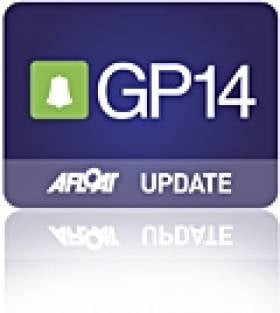Displaying items by tag: Rosses Point
Open Day Success at Wicklow Lifeboat Station
#RNLI - A steady stream of people were welcomed by Wicklow RNLI at the lifeboat station's annual open day on Sunday 14 July.
Doors opened at 11am and the volunteer lifeboat crew was on hand to give tours of the station and its two lifeboats.
Activities included face painting and a joint display by Wicklow Fire and Ambulance Services. Garda, Customs and Civil Defence also put on displays throughout the afternoon, while the Irish Coast Guard helicopter flew over with the winch crew waving to the crowd below.
The final display was a simulated call-out of the inshore lifeboat. The three crew members onboard demonstrated how fast they could get into their lifeboat gear and launch.
The planned exercise involved a rescue to an injured sailor from a boat which was located in front of the crowd. The crew handed him over to a waiting ambulance.
Folk group Sheringham Shantymen travelled from Norfolk for the open day to see the station's inshore boat, which the group funded and which was named in their honour at a ceremony in 2007.
The Shantymen entertained the crowd with music and concluded the open day with a rendition of the lifeboat anthem, Home From The Sea.
Speaking after the event, Wicklow RNLI volunteer lifeboat press officer Tommy Dover said: "We have had a fantastic weekend with the Sheringham Shantymen. One of the highlights was the concert on Saturday night where the crew was invited to join the group on stage to sing Home From the Sea.
"The crew has a long association with the Shantymen and the lifeboat they funded has rescued 32 people to date at Wicklow."
Meanwhile, a successful sea safety roadshow was held at Sligo Bay RNLI during the weekend's Sea Shanty Festival.
Numerous lifejackets were checked with many having various faults such as corded cylinder, loose cylinder or out of date firing heads. Many people also sought advice about flares, anchors and VHF radios.
RNLI Sea Safety Roadshow adviser Joe Morr said: "It was a very successful weekend in Rosses Point and I hope to bring the roadshow back again next year."
Sligo Bay RNLI Celebrates 15th Anniversary This Weekend
#RNLI - Sligo Bay RNLI will celebrate its 15th anniversary this Sunday (16 June) with an open day at the lifeboat station in Rosses Point.
There will be an opportunity to chat to the crew, have a look around the station, visit the lifeboat shop and enjoy the seafaring music provided by the groups involved in the Sea Shanty Festival which is also taking place this weekend from 14-16 June.
Sligo Bay RNLI began life in a prefab cabin at Sligo Yacht Club back in 1998. Construction on the new lifeboat station situated at the pier in Rosses Point was completed in 2002. It houses a D Class lifeboat named Elsinore and has 22 volunteer crew members, along with a fundraising team and a lifeboat shop.
As part of the Sea Shanty Festival there will a gala concert in the Yeats Country Hotel on Saturday night (15 June), all proceeds from which will go the Sligo Bay lifeboat station. Tickets are available from the lifeboat station shop, Bay View Stores, Rosses Point and Source on John St in Sligo.
Elsewhere, RNLI volunteers and supporters from around Ireland were recognised for their role in supporting and raising funds and awareness for the lifesaving charity and its crews at the RNLI Annual Presentation of Awards in the Great Hall at Trinity College Dublin.
Guest of honour was the outgoing chairman of the RNLI, Admiral the Lord Boyce, who handed out awards to 51 volunteers throughout Ireland.
Irish Coast Guard director Chris Reynolds and his wife Geraldine along with Irish Water Safety CEO John Leech were also in attendance at the ceremony, presided over by the chairman of the RNLI Council of Ireland, John Coyle.
Awards presented on the day included two Gold Badges, four Silver Badges, 19 statuettes, 17 Bronze Badges, one pair of RNLI binoculars and eight Supporter Awards.
The Gold Badges were received by Jackie O’Grady from Clifden RNLI branch for his work over 25 years with the station, and to Hugh Stafford in Wexford for his role in the setting up of the Fethard-on-Sea lifeboat station in the early 1990s and his work since then in raising funds for the charity.
Also receiving an RNLI statuette was former lifeboat man at Rosslare Harbour, Fergus Wickham, who was recognised for almost five decades of volunteering with the RNLI, first as a lifeboat man and then as a launching authority at the station.
Sligo Bay RNLI Readies To Give It Some Welly This Mayday
#RNLIMayDay - Sligo Bay RNLI in Rosses Point is counting down this week to Mayday, the charity’s annual national fundraising campaign in Ireland.
Now in its second year and running nationwide, from this Wednesday 1 to Bank Holiday Monday 6 May the RNLI is asking the public to 'give it some welly' and help its volunteers to continue to save lives at sea.
Encouraging the people of Sligo to support their local lifeboat station this week is one man who experienced first-hand the lifesaving work of the RNLI volunteers based in Rosses Point, when he was rescued in 2011.
"I guess it is always nice to know the orange boat will be coming up the bay looking for you if you get into difficulty," he said, "so remember to call as soon as you know you are in trouble."
With a fun theme in mind, the Mayday appeal is calling on people to lend their support by either purchasing a special RNLI Mayday yellow welly key ring which will be on sale for €2 in various schools in Sligo during the campaign, or by organising their own yellow welly fundraising event.
The yellow welly is an essential piece of the RNLI volunteer lifeboat crew member’s kit. Waterproof with steel-capped toes, the specially designed boots keep the volunteer crew’s feet warm and dry while also protecting them in dangerous conditions on deck.
During gale force winds, rain and ice, keeping a sure footing can literally mean the difference between life and death for volunteers. A pair of yellow wellies for crew members costs €50.
The public can also join in the social media campaign and help the RNLI raise awareness of its lifesaving work this Mayday.
All you have to do is take a photo of yourself holding an RNLI Mayday yellow welly key ring and tweet the phrase ‘I am giving it some welly for the RNLI this Mayday’ including the hashtag #RNLIMAYDAY and mentioning @RNLI.
For more information on how you can get involved or where you can purchase a key ring, log on to rnli.org/mayday
RNLI Mechanic Plots Online Course For Rosses Point Shanty Fest
#MaritimeFestivals - Organisers of the Rosses Point Shanty Festival didn't have far to cast their net when they needed someone to design their new website.
The maritime festival in aid of Sligo Bay RNLI landed a handy catch in a web designer with the sea flowing through his veins.
Not only is Daryl Ewing the mechanic for Sligo Bay's lifeboat and skipper of Ewing’s Sea Angling and Boat Charters, he is also a dab hand at plotting a course in web design.
The new website gives all the details for Rosses Point’s big event from 14 to 16 June, including the programme and details on performers who are drawn from throughout Europe.
As previously reported on Afloat.ie, the festival is now in its fourth year and has become Ireland’s premier shanty event.
"It’s great to see such a brilliant festival celebrating one of Sligo's best assets and maritime history," said Ewing. "I hope it continues long into the future, and encourage everybody to come out, take part and join in the festivities for such a great cause."
Sligo Sea Shanty Festival Returns For Fourth Year
#MaritimeFestivals - Running for the last three years, Sligo Bay RNLI is once again preparing for the Sea Shanty Festival in Rosses Point later this summer, with all proceeds going to the lifeboat station.
"The festival is a celebration of the long maritime tradition of Rosses Point and the Sligo area," as festival committee chair Willie Murphy explained last year.
"Shanties were working songs used on board sailing ships. The songs were mostly sung when the job involved several crew members working in rhythm together."
One of the many groups that have performed in the past is The Drunken Sailors from Germany, who have written a song inviting people back to Sligo Bay for the 2013 festival from 14-16 June.
The group’s story goes that back in the summer of 2012, the Drunken Sailor Shantymen were infected by the ‘Sligo Bay Virus’, and they asked their witch-doctor what medicine would help.
"You were infected by a well-known serious music virus out of the north-west of Ireland," they were told. "And the only think what may help, is to sing a song which tells a story of Sligo Bay.
"But take the medicine without any alcohol or other drugs, sing a great song for all friends of shanty music and you will get better!"
With this advice, the brave Drunken Sailor Shantymen started to sing the song you can hear in the video above, and which they think may move all famous artists to come back to Rosses Point Sea Shanty Festival later this year.
Mirror Euro Pics HERE!
Photographer Gareth Craig has loaded new images from the Mirror European dinghy championships in Sligo to the Afloat gallery. Click HERE.
Sligo Yacht Club hosted the GP 14 Summer Open and Irish Youth Championships at Rosses Point on the 24th and 25th July.
26 boats lined up at the start. Gus Henry, himself a GP 14 sailor can always be relied upon to provide exceptional race management. He called back race 1 after a significant wind change. The race started proper a short while after that. Keith Louden and Dessie Hughes from Lough Foyle Yacht Club got to the weather mark first in 12 knots of wind, followed by local sailors Niall Henry and James Conlon. In third, Shane McCarthy and Al Fry followed close behind in their new boat. Niall Henry took line honours in the race after sailing a flawless race and taking the lead on the second beat. Paddy O'Connor and Tania McHale climbed from fourth to take second. McCarthy and Fry took third.
Race 2 followed shortly after. This time, there was a definite interest by Paul Maguire and Niamh McCormick from Sutton SC in the right hand side as the tide was picking up in pace. Alastair Duffin and Paul Whitcombe from Newtownards SC went that way too but not quite as far out. Shane and Fry chose the middle route, while the Mc Guinness Brothers from Moville Boat Club initially went left and then back into the middle right. At the weather mark, Maguire and McCormick had a clear lead with McCarthy and Fry in second with the McGuinness brothers a short distance away. The McGuinness brothers passed McCarthy and Fry on the second reach. Maguire and McCormick maintained their lead to the finish with half a boat length to spare at the end with the Donegal team a close second.
Race three got under way in similar wind to the first day but this time the tide was going out. The boats that went left looked good initially, but their hopes were soon dashed as the right side of the fleet piled in to the weather mark. Henry and Conlon though, who had sailed a middle course got to the weather mark first with about 7 boat lengths to spare. They let nothing slip and finished with a convincing first. With 1-5-1 in a four race series, they couldn't be beaten and didn't start race 4. The McGuinness brothers won race four taking the lead in the first reach, leaving them second overall. Conor Byrne and Pamela Lee, first time GP sailor were second and O'Connor and McHale finished third giving them third in the event.
The silver fleet was won by Nigel Sloane and Laura McFarland with Gerry Gilligan and Lucia Nicholson in second and Johnny Park and Bob Stinson in third.
The bronze fleet was won by Conor Byrne and Pamela Lee, Wai Manu and Don MacCormack in second and Bill Johnson and Stephen Byrne in third.



























